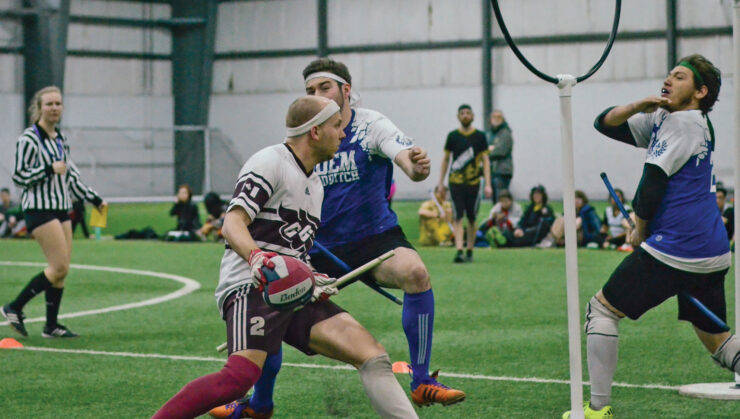Top-ranked team prepares for push to national title in April
On Feb. 27, the University of Ottawa’s quidditch team was crowned the champion in the annual Eastern Regional Quidditch Championship finals in Montreal beating out 13 other teams.
Teams from across Ontario and Quebec all culminated inside of the Soccerplex Catalogna in the borough of Lachine to crown the regional champion.
After going undefeated in pool play, the Gee-Gees went straight to the quarterfinals, where they beat McGill 190-30 in the semifinals, and finally the Montreal Carabins in the finals by a score of 120-30. The Gee-Gees currently hold the number one ranking in the nation, and are favourites for the national title.
The team’s season follows the school year with the Gee-Gees playing two to three tournaments per semester. The next step for the Gees is at the National Tournament in Kingston this April, where the winning teams from the Eastern and Western regionals compete against one another for national supremacy.
Much like in the Harry Potter series, real-life quidditch is a full contact sport and rigorously competitive. The ‘muggle’ version of the game follows many of the same rules as J.K. Rowling’s sport in the wizarding world, but with certain exceptions.
For one, the players don’t fly—in place of magic broomsticks, they carry regular brooms in between their legs while playing.
As character Oliver Wood puts it in the first Harry Potter film, “Quidditch is easy enough to understand. Each team has seven players, three chasers, two beaters, one keeper, and a seeker.”
The rules differ slightly in university quidditch however, where instead of the snitch being worth 150 points, it’s only worth 30. The reason for the change was to be more inclusive of all the players instead of just focusing on the seeker.
Another big difference is that the golden snitch, which the seeker has to catch in order to end the game, is not a ball, but rather a person dressed all in yellow with a tennis ball stuffed into a sock attached to them as a tail. Essentially, the seeker has to catch the snitch in a fast-paced chase where the seeker has full authority to do as they please in order not to be caught.
Though there is no specific rule on gender distribution mentioned in the books, the game is entirely co-ed and there has to be minimum two-to-four ratio of women to men on the field at any given time.
According to fourth-year beater Mathew McVeigh, quidditch is a great sport for anyone with athletic experience who’s looking to try something new.
“If you have a heavy sports background, you’ll enjoy this sport just because it’s so multifaceted,” he said. He went on to highlight the game’s similarities to rugby, European handball, and dodgeball.
Quidditch is a challenging sport, and there’s no foolish wand waving or silly incantations when the Gees take to the field.
Members of the team all stress the sport’s growing popularity, and wish to see more people take up the game.
For anyone looking to join the winning team next year, they suggest new recruits train over the summer, follow the team on social media, and show up for tryouts in September.
Find updates on Gee-Gees quidditch and their road to nationals here and on Twitter @uo_quidditch.




